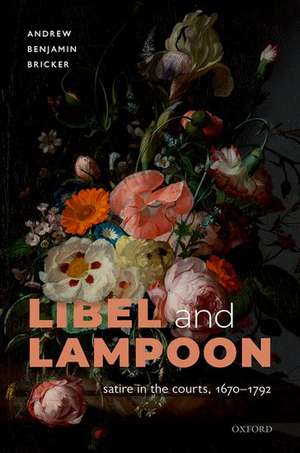Libel and Lampoon: Satire in the Courts, 1670-1792: Law and Literature
Autor Andrew Benjamin Brickeren Limba Engleză Hardback – 10 feb 2022
Preț: 525.11 lei
Preț vechi: 749.92 lei
-30% Nou
Puncte Express: 788
Preț estimativ în valută:
100.57€ • 103.61$ • 84.25£
100.57€ • 103.61$ • 84.25£
Carte tipărită la comandă
Livrare economică 12-18 februarie
Preluare comenzi: 021 569.72.76
Specificații
ISBN-13: 9780192846150
ISBN-10: 0192846159
Pagini: 342
Dimensiuni: 166 x 241 x 24 mm
Greutate: 0.67 kg
Editura: OUP OXFORD
Colecția OUP Oxford
Seria Law and Literature
Locul publicării:Oxford, United Kingdom
ISBN-10: 0192846159
Pagini: 342
Dimensiuni: 166 x 241 x 24 mm
Greutate: 0.67 kg
Editura: OUP OXFORD
Colecția OUP Oxford
Seria Law and Literature
Locul publicării:Oxford, United Kingdom
Recenzii
In investigating the mutual shaping of law and literature, Bricker... gives us a new purchase not only on how those works were understood by writers, publishers, purchasers, lawyers, judges, and jurors, but also, indirectly, on the troubled periodization within histories of satire. ... Bricker allows us to see that what have come to be recognized as generic markers of satire are really genetic markers of the struggles early eighteenth-century authors used to evade prosecution.
Built on a staggering wealth of archival research and deeply committed to advancing the wide range of scholarly debates within which it is embedded, there is no doubting the scope or magnitude of the contribution this text makes to our understanding of eighteenth-century law, literature and culture.
Libel and Lampoon offers up a masterly account, nuanced and incisive, of the unpredictable dynamics through which literary satire and legal protocols came to shape one another following the late seventeenth-century collapse of the licensing system. Andrew Bricker writes with fluency and verve, and he navigates the complexities and dodges of encoded defamation and legal hermeneutics with unfailing vigilance. Grounded in enterprising archival scholarship and skilled interpretation of verbal irony, this book is a major contribution to scholarship on literature and law during the golden age of satire.
Andrew Bricker's supple and energetic Libel and Lampoon can be read – and with profit – as an entertaining account of a long game of whack-a-mole, in which courts and comedic expression, lugubrious legality and satiric mockery, chase one another through the presses, pages, pamphlets, and poetry of post-Restoration England, each shaping and reshaping the other in a constant and dizzying display of creative interpretive adaptation.
Libel and Lampoon will change the way we think about satire—both its literary history and its generic ambiguity—while revising our understanding of the history of libel law and the freedom of the press more generally. This well-researched, well-written, rigorous and witty book on the complex and symbiotic relationship between satire and the law makes important and original contributions to the study of satire and the field of law and literature. Bricker convincingly demonstrates that satire and the law mutually influenced and shaped one another through a series of thorny skirmishes around questions of meaning and authorial ownership at the heart of Enlightenment thought.
Built on a staggering wealth of archival research and deeply committed to advancing the wide range of scholarly debates within which it is embedded, there is no doubting the scope or magnitude of the contribution this text makes to our understanding of eighteenth-century law, literature and culture.
Libel and Lampoon offers up a masterly account, nuanced and incisive, of the unpredictable dynamics through which literary satire and legal protocols came to shape one another following the late seventeenth-century collapse of the licensing system. Andrew Bricker writes with fluency and verve, and he navigates the complexities and dodges of encoded defamation and legal hermeneutics with unfailing vigilance. Grounded in enterprising archival scholarship and skilled interpretation of verbal irony, this book is a major contribution to scholarship on literature and law during the golden age of satire.
Andrew Bricker's supple and energetic Libel and Lampoon can be read – and with profit – as an entertaining account of a long game of whack-a-mole, in which courts and comedic expression, lugubrious legality and satiric mockery, chase one another through the presses, pages, pamphlets, and poetry of post-Restoration England, each shaping and reshaping the other in a constant and dizzying display of creative interpretive adaptation.
Libel and Lampoon will change the way we think about satire—both its literary history and its generic ambiguity—while revising our understanding of the history of libel law and the freedom of the press more generally. This well-researched, well-written, rigorous and witty book on the complex and symbiotic relationship between satire and the law makes important and original contributions to the study of satire and the field of law and literature. Bricker convincingly demonstrates that satire and the law mutually influenced and shaped one another through a series of thorny skirmishes around questions of meaning and authorial ownership at the heart of Enlightenment thought.
Notă biografică
Andrew Benjamin Bricker is an Assistant Professor of English Literature in the Department of Literary Studies at Ghent University and a Senior Fellow at the Andrew W. Mellon Society of Fellows in Critical Bibliography at the Rare Book School at the University of Virginia. He received his BA and MA from the University of Toronto and his PhD from Stanford University. Before joining UGent, he was a Mellon Foundation Postdoctoral Fellow in the Humanities at McGill University and a Killam Postdoctoral Research Fellow at the University of British Columbia.









